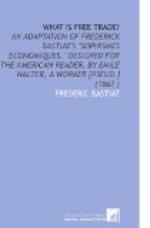Industry, the navy, labor, have for their end, the general good, the public good. To create a useless industry, in order to favor superfluous transportation; to feed superfluous labor, not for the good of the public, but for the expense of the public—this is to realize a veritable begging the question. Work, in itself, is not a desirable thing; its result is; all work without result is a loss. To pay sailors for carrying useless waste matter across the sea is like paying them for skipping stones across the surface of the water. So we arrive at this result: that all economical sophisms, despite their infinite variety, have this in common, that they confound the means with the end, and develop one at the expense of the other.
CHAPTER XXII.
METAPHORS.
Sometimes a sophism dilates itself, and penetrates through the whole extent of a long and heavy theory. More frequently it is compressed, contracted, becomes a principle, and is completely covered by a word. A good man once said: “God protect us from the devil and from metaphors!” In truth, it would be difficult to say which of the two creates the more evil upon our planet. It is the demon, say you; he alone, so long as we live, puts the spirit of spoliation in our hearts. Yes; but he does not prevent the repression of abuses by the resistance of those who suffer from them. Sophistry paralyzes this resistance. The sword which malice puts in the assailant’s hand would be powerless, if sophistry did not break the shield upon the arm of the assailed; and it is with good reason that Malebranche has inscribed at the opening of his book, “Error is the cause of human misery.”
See how it comes to pass. Ambitious hypocrites will have some sinister purpose; for example, sowing national hatred in the public mind. This fatal germ may develop, lead to general conflagration, arrest civilization, pour out torrents of blood, draw upon the land the most terrible of scourges—invasion. In every case of indulgence in such sentiments of hatred they lower us in the opinion of nations, and compel those Americans, who have retained some love of justice, to blush for their country. Certainly these are great evils; and in order that the public should protect itself from the guidance of those who would lead it into such risks, it is only necessary to give it a clear view of them. How do they succeed in veiling it from them? It is by metaphor. They alter, they force, they deprave the meaning of three or four words, and all is done.
Such a word is invasion itself. An owner of an American furnace says, “Preserve us from the invasion of English iron.” An English landlord exclaims, “Let us repel the invasion of American wheat!” And so they propose to erect barriers between the two nations. Barriers constitute isolation, isolation leads to hatred, hatred to war, and war to invasion. “Suppose it does,” say the two sophists; “is it not better to expose ourselves to the chance of an eventual invasion, than to accept a certain one?” And the people still believe, and the barriers still remain.




